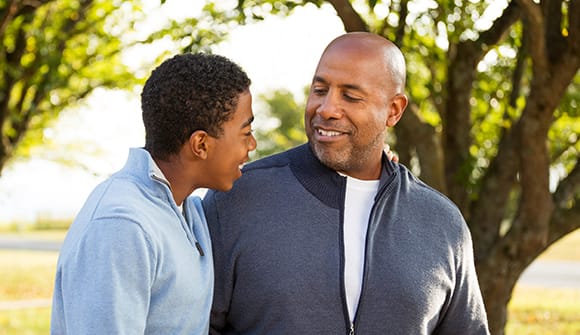Talking mental health
How to get kids and teens to open up.
Article Date:

They're conversations you never want to have: death of a loved one, distress and despair. These are tough topics for anyone to discuss, let alone with your child or teenager. But you need to do it.
"By addressing these topics head-on, you're helping to keep your kids safer by creating a trusting environment," said Francesca Varallo Sims, PsyD, director of Education and Training for Baptist Behavioral Health and Wolfson Children's Behavioral Health.
COVID's impact on adolescent mental health
Before COVID-19, one in five children lived with a significant mental illness. That increased to one in three children during the pandemic. Wolfson Children's Hospital saw a large increase in emergency behavioral health admissions (including overdoses, anxiety, depression and eating disorders) since the pandemic began.
Half of all lifetime mental health issues start by age 14. Suicide is the second-leading cause of death in people aged 15 to 25, and suicide attempts rose 50% in girls ages 12 to 17 in the first few months of 2021, according to the Centers for Disease Control and Prevention (CDC).
The pandemic worsened an already existing crisis.
Missing the signs for help
Confiding in a friend helped a Jacksonville teen find hope. When mom Jennifer Sampson arrived home one afternoon in August 2020, the former crisis response counselor couldn't believe police officers were at her front porch. The Jacksonville Sheriff's Office was responding to a call that her then-15-year-old son, Zachary, was suicidal. She's helped countless parents in emergency situations, but she didn't see the signs in her own son.
A socially and academically strong kid in school, Zachary started to change his freshman year. He became withdrawn, irritable and depressed when the COVID-19 pandemic hit. His grades slipped and he started caring less about his appearance.
That August afternoon, Zachary was immediately admitted to Wolfson Children's Hospital, where he was diagnosed with a major depressive disorder and ADHD. He was eventually discharged but admitted again in March 2021 following a second major depressive episode. With Wolfson Children's expert care and support, Zachary, now 16, is home and managing his condition with medication and outpatient counseling.
"Everyone at Wolfson Children's who has interacted with him has been compassionate and caring," Jennifer Sampson said. "There's nothing I would have changed for such a difficult situation."
Zachary refuses to let his diagnosis define him and he wants to inspire other struggling teens to reach out for help.
Conversation starters for mental well-being
Teens aren't necessarily going to tell you they're depressed. Often parents – no matter how tuned in – are the last to know. But surprisingly, once parents make that first move and start the conversation, teens often feel comfortable to open up.
"You just have to know what to ask," said Dr. Varallo Sims.
If you're stumped on what to say, here are some examples:
- Tell me about a time you felt nervous or worried. What made you feel better?
- What upcoming tests or activities do you have? How are you managing them?
- Describe your sleep lately. (After they respond) Do you feel rested when you wake up?
- Are you having stomach pain or headaches?
- Have you ever felt like you wanted to give up on your life or don't want to keep going? (If yes, follow up with) What has made you feel this way?
- Have you thought about hurting yourself?
- How can I support you when you feel down?
Some kids and teens are more vocal. They may express feelings of hopelessness, but parents still avoid having difficult conversations.
"If a child's experiencing physical pain, we would never hesitate in getting them checked out by a doctor," said Dr. Varallo Sims. "The same should be true with mental health. These conversations might be uncomfortable, but they're usually the best way to figure out how your child is really doing mentally."
Behaviors to watch for
You can look for possible clues your child or teen may need help, including:
- Isolation, often in his or her room
- Lack of participation in family activities
- Changes in friend groups
- Emotional or angry outbursts
- Sleeping issues
- Poor eating habits
- Vague statements like, "This place sucks," "I hate you," or "I'm tired of this"
Constantly checking in with your kids is important, said Dr. Varallo Sims.
"You know your child best," she said. "If something feels off, don't hesitate to discuss it with your child or, if that doesn't help, seek professional help immediately."
Help your child to manage mental health issues
Wolfson Children’s has tools to support children’s mental health and help kids and teens navigate challenges with confidence and care. To learn more, click here. If you need to speak to someone immediately, call the 24/7 Kids & Teens Helpline at 904.202.7900 or text LIFE to 741741.



